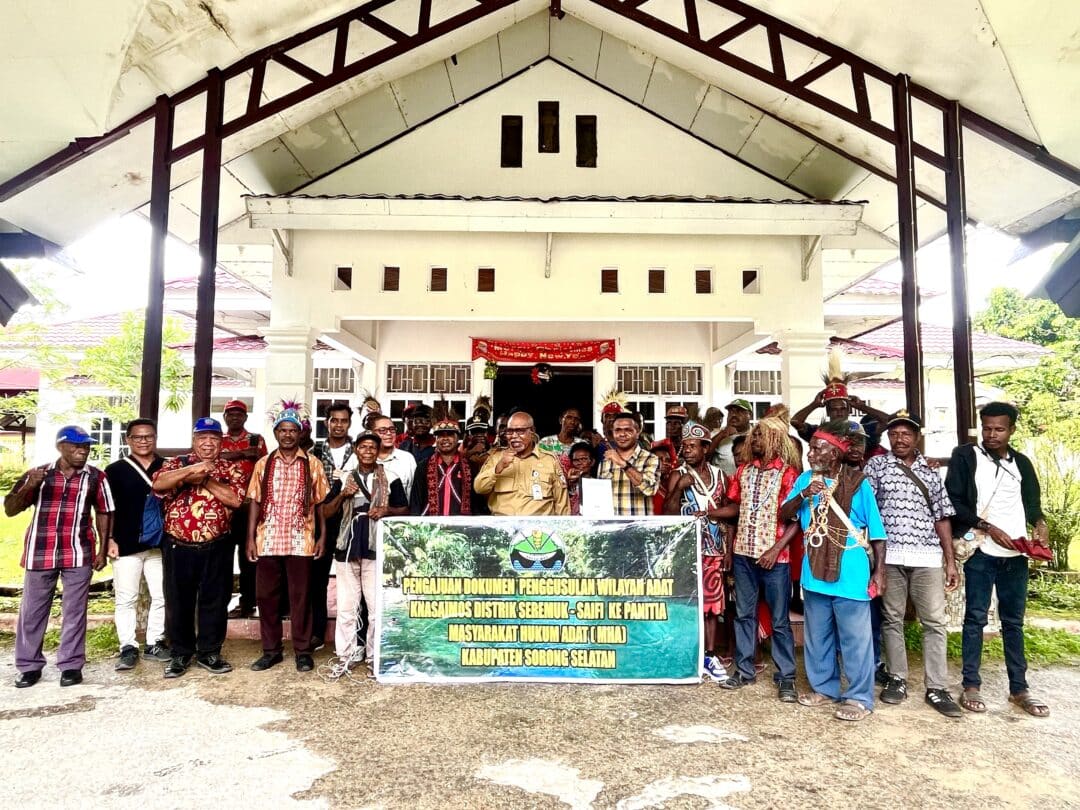Jayapura, Jubi – The Knasaimos Indigenous Community has made a formal request for acknowledgement as an indigenous group to the South Sorong Indigenous Peoples Committee. Clad in their traditional garments, they met with Dance Nauw, the Regional Secretary of South Sorong Regency and Chair of the Committee, at his official residence on Tuesday (28/11/2023).
Representatives from Knasaimos clans, administrators of the Knasaimos Indigenous Peoples Fellowship Council (DPMA), and members from Bentara Papua and Greenpeace Indonesia were part of this gathering.
Fredrik Sagisolo, the Chair of Knasaimos DPMA, urged the South Sorong Administration to promptly issue a decree recognizing the Knasaimos customary jurisdiction.
“We seek legal recognition of the Knasaimos customary territory, a place where we’ve fought against policies like transmigration, logging, and palm oil without our involvement. We hope the government acknowledges our customary territory,” said Fredrik, expressing their long-standing struggle against government policies that disregard their customary rights.
Earlier, the South Sorong Administration had enacted Regional Regulation Number 3 of 2023, aiming to recognize and protect the rights of customary law communities in the region. This regulation provides a pathway for indigenous communities in South Sorong to apply for recognition of their positions and customary territories.
The process involves submitting a written application to the South Sorong Regent through the Indigenous Peoples Committee. Last July, the Administration established the Committee tasked with identifying and verifying applications from indigenous groups.
In their application to the Committee, the Knasaimos Indigenous Community submitted various documents, including results from participatory mapping of their customary area, Knasaimos DPMA institution records, and social data as outlined in Regional Regulation Number 3 of 2023.
Syafril, representing Bentara Papua, emphasized the importance of the local government honoring existing regional regulations on recognizing and safeguarding indigenous peoples. He urged immediate legalization of the Knasaimos customary territory, citing both Regional Regulation Number 3 of 2023 and Special Regional Regulation Number 9 of 2019 issued by the West Papua Provincial Government.
The Knasaimos indigenous community, an assembly of 52 clans under the Tehit tribe, spans a customary area of 97,441.55 hectares. Since 2009, they have engaged in participatory mapping to safeguard their customary forests against oil palm and pulp plantation expansions.
In 2014, the Knasaimos indigenous community received village forest designation from the Minister of Forestry and Environment, followed by village forest management rights three years later.
Amos Sumbung, Greenpeace Indonesia Forest Campaigner, highlighted the significant role played by indigenous communities, including Knasaimos, in preserving forests and biodiversity. He stressed the imperative for the Indonesian government to recognize, respect, and protect indigenous rights by enacting the Indigenous Peoples Bill.





